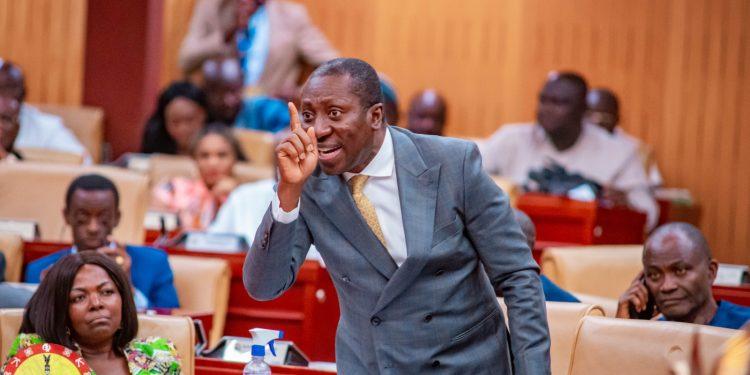Minority Leader, Alexander Afenyo-Markin, has raised concerns in Parliament regarding the appointment process of Dr. Johnson Asiama as the new Governor of the Bank of Ghana. He questioned how the nominee was allowed to take office before being confirmed by the Council of State, arguing that this move was in direct conflict with constitutional requirements.
Afenyo-Markin has called on the Minister of Finance to provide Parliament with an official briefing on the matter, highlighting that the Minority had sent a formal letter to the President, but had not yet received a response.
“We strongly believe that the Minister of Finance, if scheduled to appear before us, could shed light on what’s happening at the central bank,” he stated.
Speaking in Parliament on Friday, February 7, the Minority Leader also expressed concerns about the leadership vacuum at the Bank of Ghana. With Governor Dr. Ernest Addison on leave in preparation for his retirement and only one deputy governor remaining after the resignation of another, Afenyo-Markin emphasized that there should be no urgency in appointing a nominee to assume office.
“There is no leadership gap that warrants a nominee rushing to take over. A deputy governor can serve as acting governor until the Council of State completes its deliberations,” he explained.
Afenyo-Markin called on the Majority Leader and Government Business Leader to ensure that discussions regarding the matter take place in the coming week.
The Minority Leader also weighed in on the ongoing investigation into the disruption that occurred at the Appointments Committee sitting, criticizing the decision to make the hearings public despite Speaker Alban Bagbin’s earlier instruction for them to be held privately.
He reminded Parliament that Speaker Bagbin had directed that the Ad Hoc Committee’s hearings should not be publicly discussed and that members could verify the video evidence themselves.
Afenyo-Markin revealed that, in consultation with the Majority Leader, an agreement had been made to suspend the committee’s deliberations until Speaker Bagbin returned. However, the committee chairperson continued with the hearings and made public statements that Afenyo-Markin deemed inappropriate and biased.
“It’s unfortunate that the committee chair, who should act as a neutral figure, has given at least six media interviews, making defamatory remarks about my character, attacking my integrity, and presuming guilt,” Afenyo-Markin said. He accused the chair of acting with bad faith by making public statements before the investigation reached its conclusion.
“I don’t understand why this has turned into a public hearing, with witnesses being called and various claims being made. The chair’s actions are contrary to the role of an impartial referee,” he added.
The Minority Leader called for a return to proper process and respect for due procedure, urging Parliament to avoid unnecessary public disputes that could escalate tensions.
“Enough with the insults, the attacks, and the personal attacks. We all desire peace. If we truly want to resolve this matter peacefully, let’s step back and conduct ourselves with decorum for the sake of the national interest,” Afenyo-Markin concluded.




















































































